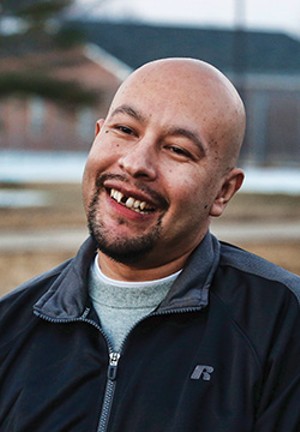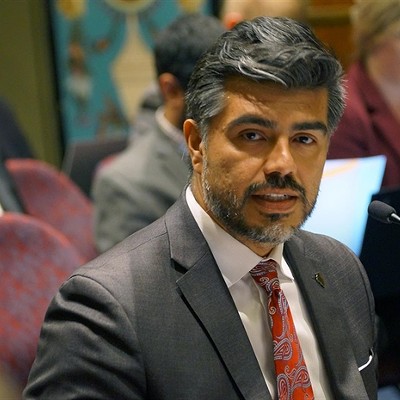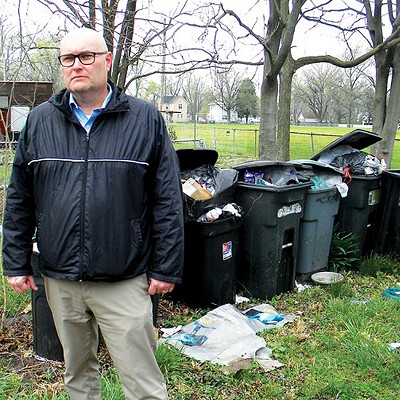Illinois Innocence Project adds Latino focus
Program aimed at overcoming barriers to justice
[
{
"name": "Air - MedRect Combo - Inline Content 1",
"component": "11490391",
"insertPoint": "3",
"requiredCountToDisplay": "1",
"parentWrapperClass": "fdn-ads-inline-content-block"
},{
"name": "Air - MedRect Combo - Inline Content 2",
"component": "11490392",
"insertPoint": "7",
"requiredCountToDisplay": "5",
"parentWrapperClass": "fdn-ads-inline-content-block"
},{
"name": "Air - MedRect Combo - Inline Content 3",
"component": "11490393",
"insertPoint": "12",
"requiredCountToDisplay": "9",
"parentWrapperClass": "fdn-ads-inline-content-block"
}
]
Angel Gonzalez spoke almost no English in 1994 when he became the prime suspect in a rape at an apartment complex in Waukegan. Gonzalez was wrongly convicted of the crime, imprisoned for nearly 21 years and finally freed earlier this year with help from the Illinois Innocence Project. If Gonzalez had spoken English in 1994, he might never have been convicted in the first place.
Gonzalez’s case is emblematic of a problem that the Illinois Innocence Project hopes to address with its new Latino Innocence Initiative. Latino defendants who don’t speak English face a major disadvantage in the criminal justice system, which can lead to wrongful convictions and shattered lives.
Based at the University of Illinois Springfield, the Illinois Innocence Project helps inmates with credible claims of innocence seek exoneration. About 14 percent of the U.S. inmate population is Latino people who speak English to varying degrees, and about 65 of IIP’s pending cases involve Latino defendants claiming actual innocence.
“The system is flawed on a good day, when you’re dealing with people who all speak the same language,” said John Hanlon, executive director and legal director for the Illinois Innocence Project. “When you add in the factor of language barriers, it’s beyond flawed. It’s unworkable, it’s risky and it’s frankly scary.”
IIP volunteer Bob Sharpe says the difficulties for Latino defendants who only speak Spanish start at the moment they’re first approached by police. Such defendants may not understand their Miranda Rights if read in English, or they may be pressured to sign confessions written in English. Sharpe cited one case in which police interrogated a Spanish-speaking suspect for several hours through a translator. The translator eventually left, Sharpe said, but the interrogation continued in English, resulting in a dubious confession. While defendants who don’t speak English are afforded a translator during court hearings, Sharpe said such defendants may be unable to communicate with their defense attorney if the attorney isn’t bilingual.
“Imagine you’re in a foreign country, struggling just to order food, and all of a sudden, you’re thrown into a lockup,” Hanlon said. “You don’t understand the police officers or your lawyer. You certainly don’t understand the interrogations that are coming at you 100 miles per hour. It’s a real challenge.”
Hanlon said inmates who don’t speak English often ask English-speaking inmates for help with legal paperwork or applying for help from groups like IIP. Doing so can be risky, Hanlon said, because inmates sometimes exercise vigilante justice in prison.
“Our applicants typically have been convicted of murders or sexual assaults, which are high-profile, difficult cases,” he said. “Sexual assault defendants in particular are at great risk – whether innocent or guilty. They don’t want to share details of a case because they don’t know who they can trust.”
Hanlon adds that there are other problems besides the language barrier facing Latino immigrants accused of crimes.
“What we’re hearing from our Latino applicants is that there is very commonly a threat of deportation of their family if they don’t cooperate,” he said. “What kind of choice are you put in? Implicate yourself or watch your family be sent away. It’s a horrible situation to be in.”
In September, the Illinois Innocence Project received a grant of $753,958 from the U.S. Department of Justice to fund DNA testing in cases with Latino defendants, among other cases. Hanlon says the grant allows the project to hire two bilingual attorneys.
The project is working on translating its forms into Spanish and has also posted a Spanish version of the application form on its website.
Gabriela Ortiz is a criminal justice student in her junior year at UIS and one of five Spanish-speaking students helping launch the Latino Innocence Initiative. Ortiz says the project was previously unable to evaluate cases involving Latino defendants in a timely manner because of the sheer volume of requests the project receives.
“I really hope we’re able to help some of these inmates,” she said.
Contact Patrick Yeagle at [email protected].
Gonzalez’s case is emblematic of a problem that the Illinois Innocence Project hopes to address with its new Latino Innocence Initiative. Latino defendants who don’t speak English face a major disadvantage in the criminal justice system, which can lead to wrongful convictions and shattered lives.
Based at the University of Illinois Springfield, the Illinois Innocence Project helps inmates with credible claims of innocence seek exoneration. About 14 percent of the U.S. inmate population is Latino people who speak English to varying degrees, and about 65 of IIP’s pending cases involve Latino defendants claiming actual innocence.
“The system is flawed on a good day, when you’re dealing with people who all speak the same language,” said John Hanlon, executive director and legal director for the Illinois Innocence Project. “When you add in the factor of language barriers, it’s beyond flawed. It’s unworkable, it’s risky and it’s frankly scary.”
IIP volunteer Bob Sharpe says the difficulties for Latino defendants who only speak Spanish start at the moment they’re first approached by police. Such defendants may not understand their Miranda Rights if read in English, or they may be pressured to sign confessions written in English. Sharpe cited one case in which police interrogated a Spanish-speaking suspect for several hours through a translator. The translator eventually left, Sharpe said, but the interrogation continued in English, resulting in a dubious confession. While defendants who don’t speak English are afforded a translator during court hearings, Sharpe said such defendants may be unable to communicate with their defense attorney if the attorney isn’t bilingual.
“Imagine you’re in a foreign country, struggling just to order food, and all of a sudden, you’re thrown into a lockup,” Hanlon said. “You don’t understand the police officers or your lawyer. You certainly don’t understand the interrogations that are coming at you 100 miles per hour. It’s a real challenge.”
Hanlon said inmates who don’t speak English often ask English-speaking inmates for help with legal paperwork or applying for help from groups like IIP. Doing so can be risky, Hanlon said, because inmates sometimes exercise vigilante justice in prison.
“Our applicants typically have been convicted of murders or sexual assaults, which are high-profile, difficult cases,” he said. “Sexual assault defendants in particular are at great risk – whether innocent or guilty. They don’t want to share details of a case because they don’t know who they can trust.”
Hanlon adds that there are other problems besides the language barrier facing Latino immigrants accused of crimes.
“What we’re hearing from our Latino applicants is that there is very commonly a threat of deportation of their family if they don’t cooperate,” he said. “What kind of choice are you put in? Implicate yourself or watch your family be sent away. It’s a horrible situation to be in.”
In September, the Illinois Innocence Project received a grant of $753,958 from the U.S. Department of Justice to fund DNA testing in cases with Latino defendants, among other cases. Hanlon says the grant allows the project to hire two bilingual attorneys.
The project is working on translating its forms into Spanish and has also posted a Spanish version of the application form on its website.
Gabriela Ortiz is a criminal justice student in her junior year at UIS and one of five Spanish-speaking students helping launch the Latino Innocence Initiative. Ortiz says the project was previously unable to evaluate cases involving Latino defendants in a timely manner because of the sheer volume of requests the project receives.
“I really hope we’re able to help some of these inmates,” she said.
Contact Patrick Yeagle at [email protected].
Illinois Times has provided readers with independent journalism for almost 50 years, from news and politics to arts and culture.
Your support will help cover the costs of editorial content published each week. Without local news organizations, we would be less informed about the issues that affect our community..
Got something to say?
Send a letter to the editor and we'll publish your feedback in print!
















